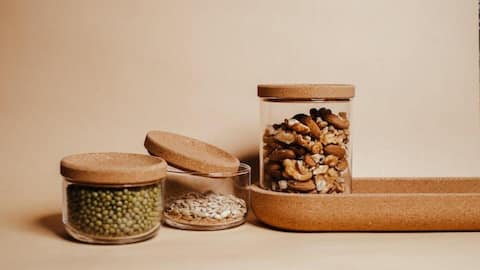How to store your food sustainably, minus the plastic
What's the story
Plastics have become so ingrained in our lives that we now believe we would not be able to function without them. When it comes to the kitchen, one of the most pervasive challenges is minimizing our reliance on plastic for food storage. Embracing eco-friendly alternatives fosters a healthier lifestyle. Here are five creative and sustainable ways to store food without using plastic.
Option 1
Glass jars and boxes
Glass containers offer an eco-friendly alternative to plastic, despite their reputation for being breakable. Their reliability lies in their ability to keep food fresh without any risk of chemical leaching. These are usually suitable for foods that are simpler to grasp and consume right out of the container, such as salads, burgers, wraps, sandwiches, and roasted vegetables. They are also good for packing leftovers.
Option 2
Steel tiffin boxes
These classic stainless steel containers boast an integrated carrying handle, making them effortlessly portable from one place to another. Featuring distinct sections, these tiffins keep various items separate, ensuring your lunch remains neatly compartmentalized without mixing. They're a smart choice for packing lunches with multiple components. You can also use them to store peeled and chopped vegetables in the fridge.
Option 3
Beeswax wraps
Beeswax wraps serve as an alternative to plastic wrap, ideal for covering half-cut onions and apples, draping over dishes for storage, or crafting pockets for storing baked goods, sandwiches, and snacks. Since beeswax wraps are so moldable, all you have to do is warm them up in your hands to get them to stick to a bowl or your meal.
Option 4
Cloth bags
Another eco-friendly alternative to plastic bags for keeping food is cloth bags. They are a natural and biodegradable choice because they are composed of cotton or linen fabric. They come in different sizes, can be washed, and are hence reusable. Cloth bags are suitable for storing dry food items, such as fruits, vegetables, cereals, grains, and beans in the refrigerator.
Option 5
Ceramic containers
Food can be stored in fashionable and environmentally friendly ceramic containers instead of plastic ones. They can be used to keep both dry and wet meals and are long-lasting and non-reactive. They are simple to clean and come in a variety of sizes. Ceramic containers are ideal for storing wet items like soups and stews or dry items like spices, herbs, and tea leaves.
